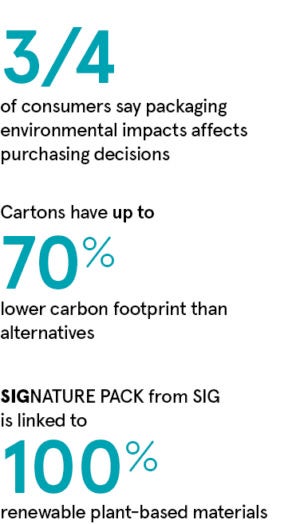Sustainability of packaging is an increasingly hot topic with Sir David Attenborough’s The Blue Planet TV series sharpening the focus on pressing environmental challenges such as plastic waste in our oceans.
Three quarters of consumers now say the environmental impact of a product’s packaging affects their purchasing decisions and 90 per cent want packaging to be easily recyclable, according to latest figures from the 2018 European Consumer Packaging Perceptions Survey of 7,000 shoppers.
Food and drink are the products people purchase most frequently and packaging options here range from metal cans and glass bottles to pouches, plastic bottles and more. Thanks to their main ingredient – renewable paper board made from wood – cartons are the natural choice when it comes to reducing environmental impact.
Independent assessments of the life cycle of beverage cartons show they have lower environmental impact than many other types of packaging for a range of products, including long-life food, UHT milk and non-carbonated soft drinks. In fact, the life-cycle carbon footprint of a carton is between 28 per cent and 70 per cent lower than the alternatives, and cartons use 41 per cent to 68 per cent fewer fossil-fuel resources.
But one leading systems and solutions provider for aseptic carton packaging is going further. SIG has set a bold ambition to go “Way Beyond Good”.
“Sustainability has been increasing in leaps and bounds in recent years, but we want to take it further,” says Martin Herrenbrück, the company’s president and general manager for Europe. “Our ambition is to work with our partners to create a net-positive food supply system that will nourish a growing global population while contributing more to society and the environment than we take out.
“We set out to become a net-positive company three years ago and we’ve already achieved some significant milestones on this journey in the way we source our raw materials, make our products and run our business.”
Consumers increasingly want to feel good about the food and drink they buy, and that includes the way it’s packaged
SIG now offers its customers a menu of features that they can use to improve the credentials of its packaging in the eyes of consumers. These range from the option to put the FSC®1 (Forest Stewardship Council®) label on any SIG pack to using polymers linked to 100 per cent forest-based materials.
“More and more of our customers are taking up solutions like combibloc EcoPlus and SIGNATURE PACK,” says Mr Herrenbrück. SIG’s combibloc EcoPlus is 82 per cent renewable and requires 28 per cent less CO2 to produce than conventional cartons in the same format. Its innovative design eliminates the aluminium layer by using an ultra-thin polyamide layer to protect the flavour of the food or drinks that the packaging contains.
 SIGNATURE PACK 100 is the world’s first aseptic carton linked to 100 per cent renewable plant-based materials, via an innovative mass-balance approach that supports the use of renewable feedstock in mainstream polymer production. It has up to 66 per cent2 lower life-cycle carbon footprint than the company’s standard packs. Meanwhile, combi-blocRS, the new standard structure for SIG’s cartons, has saved more than 4,850 tonnes of polymer since it was introduced in 2016.
SIGNATURE PACK 100 is the world’s first aseptic carton linked to 100 per cent renewable plant-based materials, via an innovative mass-balance approach that supports the use of renewable feedstock in mainstream polymer production. It has up to 66 per cent2 lower life-cycle carbon footprint than the company’s standard packs. Meanwhile, combi-blocRS, the new standard structure for SIG’s cartons, has saved more than 4,850 tonnes of polymer since it was introduced in 2016.
SIG is also helping to tackle concerns about plastic straws with the world’s first market-ready alternative for use with aseptic carton packs. “Our paper straw solution is helping customers meet the urgent demand from stakeholders to cut out plastic straws amid growing concerns about their impact on the environment and particularly on the world’s oceans,” says Mr Herrenbrück.
“Consumers increasingly want to feel good about the food and drink they buy, and that includes the way it’s packaged. We’re helping our customers meet this demand with more sustainable product innovations as part of our ambition to go ‘Way Beyond Good’ for the environment and society.”
To find out more please visit www.sig.biz

